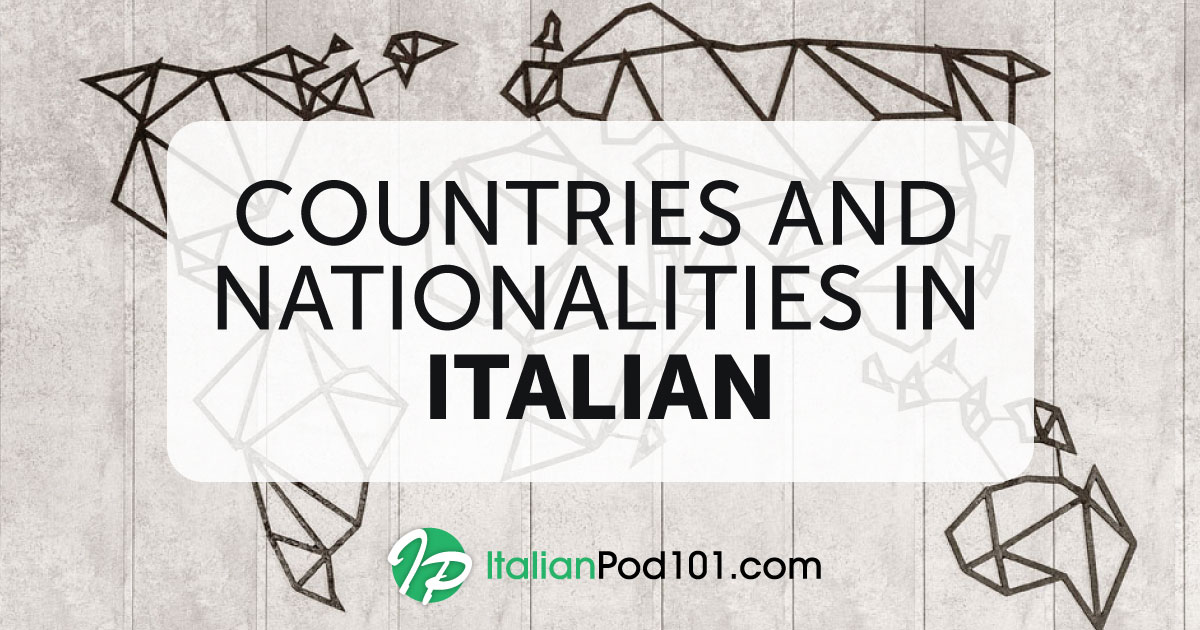
Verbs are everywhere! Whatever you’re trying to say or write in Italian, you’re going to need to use a verb and a subject. And guess what? Right there, you already need to conjugate the verb to use it correctly.
- Vado al cinema. Vieni con me? Cosa dici?
“I go to the movies. Will you come with me? What do you say?”
For example, in this simple sentence, you’ll have to know the conjugations of the verbs andare (“to go”), venire (“to come”), and dire (“to say”).
Italian verb conjugation might seem tough at first, but with a few tips (and ItalianPod101’s resources), you’ll learn how to conjugate Italian verbs and become a real pro!
 Table of Contents
Table of Contents
- What Does Conjugation Mean?
- Verb Groups
- Conjugation Examples
- Irregular Verbs and Their Conjugations
- Quiz
- Tips to Improve and Practice Your Italian Conjugations
1. What Does Conjugation Mean?
What is a conjugation and what do you need it for? A conjugation is a basic process—common to most languages—by which you change the verb ending in order to indicate who is doing the action (me, you, he/she, we, you, they), with what intention (realistic, wish, opinion, order, etc.), and when (present, past, future, etc.).

Who? When? What intention? Ask questions to start conjugating.
Also, in Italian verb conjugation, you may have to:
- Conjugate auxiliary verbs (avere/essere = “to have”/”to be”)
- Conjugate modal verbs (verbi servili: potere, dovere, volere, ecc. = “can, must, want, etc.”)
- Add a participio passato (“past participle”)
- Watch out for Italian irregular verbs and irregular verb forms (dire, fare, andare, stare, venire, perdere, chiudere, and a few more…)
Let’s look at this in more detail:
1- Who?
| 1st person singular | Io | “I” |
| 2nd person singular | tu / Lei* | “you” (casual) / “you” (formal) |
| 3rd person singular | lui / lei | “he” / “she” |
| 1st person plural | noi | “we” |
| 2nd person plural | voi | “we” |
| 3rd person plural | loro | “they” |
*It’s important to remember that the polite form of address is in the third person singular feminine. So, for example, the phrase “What do you eat?” can be:
- Tu cosa mangi? (informal)
- Lei cosa mangia? (formal)
It can be a little confusing at the beginning, but since the formal way of address is extremely common in Italian, it’s a good idea to practice using it from the very beginning.
Remember that the person who is doing the action is very important because, in Italian verb conjugation, every person of the verb has a different ending. But we’ll see that in a little bit.
2- With what intention?
In every sentence, you can ask “What is the intention of this action?” This intention is called il modo (“the mood”), and it reflects whether the intention is realistic, possible, or uncertain, or if it’s a wish, an opinion, or an order.
Let’s look at this Italian conjugation table and study the moods to determine what they mean.
| Indicativo (“Indicative”) | Mangio una pizza. (“I eat a pizza.”) | Used to express a real and certain fact. This is, by far, the most common mood in Italian. |
| Conjuntivo (“Subjunctive”) | Credo che sia meglio. (“I think it is better.”) | Used to express an opinion, a possibility, a desire, or something uncertain. It’s usually supported by certain verbs and conjunctions. |
| Condizionale (“Conditional”) | Vorrei andare. (“I would like to go.”) | Used to express a probability or a hypothesis. Usually, one fact depends on another. |
| Imperativo (“Imperative”) | Fai i compiti! (“Do your homework!”) | Used to give an order. |
| The examples above are called modi finiti (“finite moods”) because they define the action in a precise way, and they’re conjugated according to the person and the time. The following ones, on the other hand, are modi indefiniti (“indefinite moods”) as they don’t have a specific subject. They usually depend on other verbs, and—very good news—they don’t change! | ||
| Infinito (“Infinitive”) | Mangiare (“To eat”) | It’s an undetermined action, used as the basic form of the verb. |
| Gerundio (“Gerund”) | Sto dormendo. (“I am sleeping.”) | Often used in combination with stare, it can have many intentions. |
| Participio (“Participle”) | Serata danzante (“Dancing night”) | A word formed from a verb and used as an adjective. |
3- When?
Every action takes place in a specific time, called tempo (literally “time,” or “tense” in the context of a conjugation). The Italian tenses are presente, passato, and futuro, and they can be tempi semplici (“simple tenses”) when they’re made of just one word, or tempi composti (“compound tenses”) when they’re formed by the auxiliary (essere/avere) and the past participle.

Io amo, tu ami… (“I love, you love…”) The best conjugation of all!
Let’s look at the full Italian conjugations chart of all possible moods and tenses with the best Italian verb: amare (“to love”).
| MODI | TEMPI SEMPLICI | TEMPI COMPOSTI | |
| Finiti | Indicativo | Presente | Amo | Passato prossimo | Ho amato |
| Imperfetto | Amavo | Trapassato prossimo | Avevo amato | ||
| Passato remoto | Amai | Trapassato remoto | Ebbi amato | ||
| Futuro semplice | Amerò | Futuro anteriore | Avrò amato | ||
| Congiuntivo | Presente | Che io ami | Passato | Che io abbia amato | |
| Imperfetto | Che io amassi | Trapassato | Che io avessi amato | ||
| Condizionale | Presente | Amerei | Passato | Avrei amato | |
| Imperativo | Presente | Ama! | ||
| Indefiniti | Gerundio | Presente | Amando | Passato | Avendo amato |
| Participio | Presente | Amante | ||
| Passato | Amato | |||
| Infinito | Presente | Amare | ||
It’s true that there are quite a lot of tenses! But keep in mind that the Italian conjugations you’ll really have to master are the ones that are in bold, as they are by far the most common. They’re also the most practical ones for meaningful communication up to an intermediate Italian level. That sounds better, doesn’t it?
2. Verb Groups

In the Italian conjugation of verbs, there are three basic groups, divided according to the verb ending in the infinitive:
- 1st with the infinitive in -ARE
- 2nd with the infinitive in -ERE (verbs ending in -arre, -orre, and -urre belong to this group)
- 3rd with the infinitive in -IRE (verbs that add a -isc suffix belong to this group)
Regular Italian verbs are simple to conjugate because they all follow the same pattern, as you can see in the following chart:
| Io (“I”) | tu (“you”) | lui/lei (“s/he”) | noi (“we”) | voi (“you”) | loro (“they”) | |
| AMARE (“to love”) | Amo | Ami | Ama | Amiàmo | Amàte | Àmano |
| CREDERE (“to believe”) | Credo | Credi | Crede | Crediàmo | Credète | Crèdono |
| DORMIRE (“to sleep”) | Dormo | Dormi | Dorme | Dormiàmo | Dormìte | Dòrmono* |
*Notice how the position of the stress changes syllable. Try and read the three basic present conjugations, just to familiarize yourself with the rhythm of it.
As you can see, there are no major changes from one group to the other. But things do get a bit more complicated with Italian irregular verb conjugations, which involve some of the most common verbs.
3. Conjugation Examples

Now that you know that Italian conjugations are divided into three groups, let’s see in greater detail how each group behaves according to the person (who), the tense (when), and the mood (with what intention).
1- Verbs in -ARE
AMARE (“To love”)
| Indicative | Subjunctive | Conditional | Imperative | ||||
| Present | Absolute Past* | Imperfect | Future | Present | Present | Present | |
| io | amo | amai | amavo | amerò | ami | amerei | – |
| tu | ami | amasti | amavi | amerai | ami | ameresti | ama |
| lui/lei | ama | amò | amava | amerà | ami | amerebbe | – |
| noi | amiamo | amammo | amavamo | ameremo | amiamo | ameremmo | amiamo |
| voi | amate | amaste | amavate | amerete | amiate | amereste | amate |
| loro | amano | amarono | amavano | ameranno | amino | amerebbero | – |
PARLARE (“To talk”)
| Indicative | Subjunctive | Conditional | Imperative | ||||
| Present | Absolute Past* | Imperfect | Future | Present | Present | Present | |
| io | parlo | parlai | parlavo | parlerò | parli | parlerei | – |
| tu | parli | parlasti | parlavi | parlerai | parli | parleresti | parla |
| lui/lei | parla | parlò | parlava | parlerà | parli | parlerebbe | – |
| noi | parliamo | parlammo | parlavamo | parleremo | parliamo | parleremmo | parliamo |
| voi | parlate | parlaste | parlavate | parlerete | parliate | parlereste | parlate |
| loro | parlate | parlarono | parlavano | parleranno | parlino | parlerebbero | – |
GIOCARE (“To play”)
| Indicative | Subjunctive | Conditional | Imperative | ||||
| Present | Absolute Past* | Imperfect | Future | Present | Present | Present | |
| io | gioco | giocai | giocavo | giocherò* | giochi* | giocherei* | – |
| tu | giochi* | giocasti | giocavi | giocherai* | giochi* | giocheresti* | gioca |
| lui/lei | gioca | giocò | giocava | giocherà* | giochi* | giocherebbe* | – |
| noi | giochiamo* | giocammo | giocavamo | giocheremo* | giochiamo* | giocheremmo* | giochiamo* |
| voi | giocate | giocaste | giocavate | giocherete* | giochiate* | giochereste* | giocate |
| loro | giocano | giocarono | giocavano | giochino* | giochino* | giocherebbero* | – |
*Notice how, whenever the ending of the conjugation starts with i or e, the root adds an h in order to maintain the hard K sound of giocare. This will happen for all the verbs of the first group that end in -care or –gare. So, for verbs in -care or –gare:
| C + I, E = CHI, CHE (in order to keep the hard K sound) G + I, E = GHI, GHE (in order to keep the hard G sound) |
Let’s see some examples:
- Pagare (“to pay”)
Paghi tu? (“Will you pay?”)
- Cercare (“to look for”)
Cerchiamo un bar. (“We look for a bar.”)
- Giocare (“to play”)
Giocheresti con me? (“Would you play with me?”)
- Litigare (“to fight”)
Non litighiamo! (“Let’s not fight!”)
- Mancare (“to miss”)
Mi manchi tanto! (“I miss you so much!”)
- Sporcare (“to get dirty”)
Ti sporchi sempre… (“You always get dirty…”)
- Sprecare (“to waste”)
Perché sprechi la carta? (“Why do you waste paper?”)
- Navigare (“to sail”)
Navigheremo per tre notti. (“We will sail for three nights.”)
Wait… Didn’t we tell you earlier that the only verbs you really needed to master were presente, passato prossimo, imperfetto, futuro, condizionale, and imperativo (“present, present perfect, imperfect, future, conditional, and imperative”)?
You’re absolutely right! As a matter of fact, the absolute past (passato remoto) is mostly used in literary writing and very formal speech about things that happened a very long time ago. So you definitely don’t have to worry about it too much. Just be aware of it, just in case you encounter it while reading a story.
Do you know where you might actually hear passato remoto a lot? In the south of Italy, in Sicily for example, because southern dialects have no passato prossimo in their grammar. For this reason, people have historically tended to use this tense more often than other Italians.

Andai in Sicilia. (“I went to Sicily.”) Sicilians use passato remoto a lot!
On the other hand, the one that you’ll really be using all the time (in combination with the imperfect) is the present perfect (passato prossimo), which is formed by the auxiliary essere or avere (“to be” or “to have”) and the past participle. But we’ll see more about that in a little bit. For now, just take a look at what it’s like.
| Passato Prossimo – AMARE | |
|---|---|
| io | ho amato |
| tu | hai amato |
| lui/ lei | ha amato |
| noi | abbiamo amato |
| voi | avete amato |
| loro | hanno amato |
2- Verbs in -ERE
CREDERE (“To believe”)
| Indicative | Subjunctive | Subjunctive | Imperative | ||||
| Present | Absolute Past* | Imperfect | Future | Present | Present | Present | |
| io | credo | credetti | credevo | crederò | creda | crederei | – |
| tu | credi | credesti | credevi | crederai | creda | crederesti | credi |
| lui/lei | crede | credette | credeva | crederà | creda | crederebbe | – |
| noi | crediamo | credemmo | credevamo | crederemo | crediamo | crederemmo | crediamo |
| voi | credete | credeste | credevate | crederete | crediate | credereste | credete |
| loro | credono | crederono | credevano | crederanno | credano | crederebbero | – |
PRENDERE (“To take”)
| Indicative | Subjunctive | Conditional | Imperative | ||||
| Present | Absolute Past | Imperfect | Future | Present | Present | Present | |
| io | prendo | presi* | prendevo | prenderò | prenda | prenderei | – |
| tu | prendi | prendesti | prendevi | prenderai | prenda | prenderesti | prendi |
| lui/lei | prende | prese* | prendeva | prenderà | prenda | prenderebbe | – |
| noi | prendiamo | prendemmo | prendevamo | prenderemo | prendiamo | prenderemmo | prendiamo |
| voi | prendete | prendeste | prendevate | prenderete | prendiate | prendereste | prendete |
| loro | prendono | presero* | prendevano | prenderanno | prendano | prenderebbero | – |
*Just to complicate things a bit further, most verbs of the second group in -ERE have an irregular passato remoto (“absolute past”), in which the io, lui/lei, loro (“I,” “s/he,” “they”) forms can change considerably from the root. But again, this tense is rarely used in spoken Italian, so you’ll just need to recognize them in case you encounter them while reading.
LEGGERE (“To read”)
| Indicative | Subjunctive | Conditional | Imperative | ||||
| Present | Absolute Past | Imperfect | Future | Present | Present | Present | |
| io | leggo** | lessi* | leggevo | leggerò | legga | leggerei | – |
| tu | leggi | leggesti | leggevi | leggerai | legga | leggeresti | leggi |
| lui/lei | legge | lesse* | leggeva | leggerà | legga | leggerebbe | – |
| noi | leggiamo | leggemmo | leggevamo | leggeremo | leggiamo | leggeremmo | leggiamo |
| voi | leggete | leggeste | leggevate | leggerete | leggiate | leggereste | leggete |
| loro | leggono** | lessero* | leggevano | leggeranno | leggano | leggerebbero | – |
*See the note above.
**Contrary to what happens to the -care / -gare verbs in the first group (they add an h to keep the hard sound in front of e or i), in the second conjugation, verbs in -cere and -gere change sound from soft to hard in front of the ending -o (io and loro – “I” and “them”).

Che piacere leggere! (“What a pleasure to read!”)
| IO LEGGO [leggo – hard G] as in “gospel” TU LEGGI [ledʒi – soft g] as in “giant” |
Other common verbs that have the same behavior are:
- Vincere (“to win”)
Vinco sempre! (“I always win!”)
- Conoscere (“to know”)
Non ti conosco. (“I don’t know you.”)
- Crescere (“to grow”)
Come crescono questi bambini…! (“How do these kids grow…!”)
- Nascere (“to be born”)
In Italia nascono 50 bambini all’ora. (“In Italy, 50 babies are born every hour.”)
- Correggere (“to correct”)
Correggo i tuoi errori. (“I correct your mistakes.”)
- Friggere (“to fry”)
Friggo le patate. (“I fry potatoes.”)
- Leggere (“to read”)
I ragazzi leggono Pinocchio. (“Kids read Pinocchio.”)
- Aggiungere (“to add”)
Aggiungono sempre troppo sale! (“They always add too much salt!”)
- Piangere (“to cry”)
Quando sono triste piango. (“When I’m sad, I cry.”)
3- Verbs in -IRE
DORMIRE (“To sleep”)
| Indicative | Subjunctive | Conditional | Imperative | ||||
| Present | Absolute Past | Imperfect | Future | Present | Present | Present | |
| io | dormo | dormii | dormivo | dormirò | dorma | dormirei | – |
| tu | dormi | dormisti | dormivi | dormirai | dorma | dormiresti | dormi |
| lui/lei | dorme | dormì | dormiva | dormirà | dorma | dormirebbe | – |
| noi | dormiamo | dormimmo | dormivamo | dormiremo | dormiamo | dormiremmo | dormiamo |
| voi | dormite | dormiste | dormivate | dormirete | dormiate | dormireste | dormite |
| loro | dormono | dormirono | dormivano | dormiranno | dormano | dormirebbero | – |
SENTIRE (“To hear” / “To feel”)
| Indicative | Subjunctive | Conditional | Imperative | ||||
| Present | Absolute Past | Imperfect | Future | Present | Present | Present | |
| io | sento | sentii | sentivo | sentirò | senta | sentirei | – |
| tu | senti | sentisti | sentivi | sentirai | senta | sentiresti | senti |
| lui/lei | sente | sentì | sentiva | sentirà | senta | sentirebbe | – |
| noi | sentiamo | sentimmo | sentivamo | sentiremo | sentiamo | sentiremmo | sentiamo |
| voi | sentite | sentiste | sentivate | sentirete | sentiate | sentireste | sentireste |
| loro | sentono | sentirono | sentivano | sentiranno | sentano | sentirebbero | – |
CAPIRE (“To understand”)
| Indicative | Subjunctive | Conditional | Imperative | ||||
| Present | Absolute Past | Imperfect | Future | Present | Present | Present | |
| io | capisco* | capii | capivo | capirò | capisca | capirei | – |
| tu | capisci** | capisti | capivi | capirai | capisca | capiresti | capisci |
| lui/lei | capisce | capì | capiva | capirà | capisca | capirebbe | – |
| noi | capiamo | capimmo | capivamo | capiremo | capiamo | capiremmo | capiamo |
| voi | capite | capiste | capivate | capirete | capiate | capireste | capireste |
| loro | capiscono | capirono | capivano | capiranno | capscano | capirebbero | – |
*Did you notice something different about this conjugation? You’re absolutely right! Quite a few Italian verbs of the third group add an -isc suffix to the conjugation in the present, subjunctive, and imperative in the first singular (io, “I”), second singular (tu, “you”), third singular (lui/lei, “s/he”), and third plural (loro, “they”).
**Similarly to what happens to the verbs in the -cere and -gere that we just saw above, verbs that add the -isc suffix change sound from soft to hard in front of the endings -o and -a (io and loro – “I” and “them”).
| IO CAPISCO [kapisko – hard K] as in “color” TU CAPISCI [kapishi – soft sh] as in “sheep” |
Other common verbs that have the same behavior are:
- Capire (“to understand”)
Capisco [capisko] / Capisci [capishi] tutto. (“I/you understand everything.”)
- Costruire (“to build”)
Costruisco [kostruisko] / Costruisci [costruishi] una casa. (“I/you build a house.”)
- Finire (“to finish”)
Finisco [finisko] / Finisci [finishi] subito! (“I/you finish right away!”)
- Preferire (“to prefer”)
Preferisco [preferisko] / Preferisci [preferishi] l’acqua. (“I/you prefer water.”)
Now it’s your turn to try! Change the subject from io (“I”) to tu or lui/lei (“you” or “s/he”) and practice with the hard/soft pronunciation.
- Proibire (“to forbid”)
Io ti proibisco di andare! (“I forbid you to go!”) >> Lei ti ……………… di andare! (“He forbids you to go!”)
- Pulire (“to clean”)
Io pulisco la mia stanza. (“I clean my room.”) >> Tu …………….. la mia stanza. (“He cleans my room.”)
- Punire (“to punish”)
Non punisco gli sbagli. (“I don’t punish mistakes.”) >> Lui non ………… gli sbagli. (“He doesn’t punish mistakes.”)
- Restiture (“to give back”)
Io restituisco il libro. (“I give back the book.”) >> Tu …………….. il libro. (“You give back the book.”)
- Trasferire (“to transfer” / “to move”)
Io mi trasferisco a Roma. (“I move to Rome.”) >> Tu ti …………….. a Roma. (“You move to Rome.”)
4. Irregular Verbs and Their Conjugations

As it often happens, some of the most common verbs are irregular and, although they continue to follow a pattern to a certain point, they can differ quite a lot from what you expect.
Let’s start with the most important Italian irregular conjugations: essere (“to be”) and avere (“to have”).
ESSERE (“To be”)
| Indicative | Subjunctive | Conditional | Imperative | ||||
| Present | Absolute Past | Imperfect | Future | Present | Present | Present | |
| io | sono | fui | ero | sarò | sia | sarei | – |
| tu | sei | foste | eri | sarai | sia | saresti | sii |
| lui/lei | è* | fu | era | sarà | sia | sarebbe | – |
| noi | siamo | fummo | eravamo | saremo | siamo | saremmo | siamo |
| voi | siete | foste | eravate | sarete | siate | sareste | siate |
| loro | sono | furono | erano | saranno | siano | sarebbero | – |
*The third person singular lui/lei è (“s/he is”) requires the grave accent to distinguish it from the conjunction e (“and”). Even if it might seem like a small detail, it’s considered a big mistake, so double your attention!
AVERE (“To have”)
| Indicative | Subjunctive | Conditional | Imperative | ||||
| Present | Absolute Past | Imperfect | Future | Present | Present | Present | |
| io | ho* | ebbi | avevo | avrò | abbia | avrei | – |
| tu | hai* | aveste | avevi | avrai | abbia | avresti | abbi |
| lui/lei | ha* | ebbe | aveva | avrà | abbia | avrebbe | – |
| noi | abbiamo | avemmo | avevamo | avremo | abbiamo | avremmo | abbiamo |
| voi | avete | aveste | avevate | avrete | abbiate | avreste | abbiate |
| loro | hanno* | ebbero | avevano | avranno | abbiano | avrebbero | – |
*In Italian, you’ll never find the H at the beginning of a word, except for in foreign words such as “hotel” and the avere conjugation. For some reason, only the first singular (io, “I”), second singular (tu, “you”), third singular (lui/lei, “s/he”), and third plural (loro, “they”) in the present keep the H from the Latin conjugation habere. However, nothing changes in the pronunciation.
1- AVERE & ESSERE as auxiliaries with passato prossimo (“present perfect”)
Remember how we told you that the absolute past isn’t really used in colloquial Italian, and you would more often use the passato prossimo? Passato prossimo is formed with an auxiliary avere/essere and the past participle, which is formed as follows:
- Verbs in -are >> -ato
Ex: Parlare >> ho parlato / Andare >> sono andato
- Verbs in -ere >> -uto
Ex: conoscere >> conosciuto
- Verbs in -ire >> -ito
Ex: dormire >> dormito
- Essere >> stato
- Avere >> avuto
But how do you know which auxiliary to use? Here’s how it works.
Transitive verbs (verbs that can have a direct object) form the passato prossimo with the auxiliary AVERE:
- Amare Ho amato mio marito. (“I loved my husband.”)
- Vendere Ho venduto la mia macchina. (“I sold my car.”)
- Capire Ho capito quello che hai detto. (“I understood what you said.”)
Intransitive verbs (verbs that can’t have a direct object, and that usually indicate state, movement, change, etc.) form the passato prossimo with the auxiliary ESSERE:
- Andare Sono andato al cinema. (“I went to the movies.”)
- Venire Sono venuto con te. (“I came with you.”)
- Uscire Sono uscito. (“I went out.”)
Other intransitive verbs that need the essere auxiliary are: salire, restare, tornare, ritornare, scendere, arrivare, cadere, entrare, and more.
Irregular verbs in Italian are quite frequent and common. Here’s a basic list with their conjugations in the present indicative, from which you can deduct the rest of the patterns.
| DIRE | DARE | FARE | ANDARE | VENIRE | VOLERE | SAPERE | POTERE | USCIRE | |
| io | dico | do | faccio | vado | vengo | voglio | so | posso | esco |
| tu | dici | dai | fai | vai | vieni | vuoi | sai | puoi | esci |
| lui/lei | dice | da | fa | va | viene | vuole | sa | può | esce |
| noi | diciamo | diamo | facciamo | andiamo | veniamo | vogliamo | sappiamo | possiamo | usciamo |
| voi | dite | date | fate | andate | venite | volete | sapete | potete | uscite |
| loro | dicono | danno | fanno | vanno | vanno | vogliono | sanno | possono | escono |
Do you think that these are enough? No way! There are many more irregular verbs in Italian you can have fun with.
5. Quiz
Do you think that you know enough about Italian conjugations? Let’s do a quick test.
Fill in the blanks with the correct verb, paying attention to the subject and the tense:

Quiz time!
- Gli Italiani (amare) _______________ il caffè molto forte.
(“Italians love very strong coffee.”) - Domani tu (andare) ______________ al cinema con i tuoi amici?
(“Tomorrow, will you go to the movies with your friends?”) - Quando noi (essere) __________ piccoli, (credere) ___________ a Babbo Natale!
(“When we were kids, we believed in Santa Claus!”) - Io (volere) _____________ un gelato al limone, per favore.
(“I would like a lemon ice cream, please.”) - Un anno fa Laura (finire) ______________ la scuola.
(“A year ago, Laura finished school.”)
Let’s check the answers together:
1) Amano: This is the third person plural of the present.
2) Andrai: This is the second person singular of the future, since domani tells us that the action takes place in the future.
3) Eravamo, Credevamo: These are both first person plural of the imperfect, which is the tense we use for describing a generic time, not a specific moment.
4) Vorrei: Here, we use the first person singular of the conditional, since we’re expressing a wish or a polite request.
5) Ha finito: In this case, the past tense that we need is the passato prossimo, since it’s an action that occurred at a specific time.
Did you get them all correct?
6. Tips to Improve and Practice Your Italian Conjugations
Italian conjugations can seem like a lot to take in, but there are tricks and strategies that you can use to help you learn and remember them.
For example, you can try to memorize each verb as a chant (amo, ami, ama, amiamo, amate, amano…). This way, you’ll memorize the patterns and they’ll stick forever. Repetition always helps, so do as many exercises as you can. Reading, listening to music, and watching videos is also extremely useful in getting familiar with different kinds of verbs in context.
And the final tip: Make sure that you take advantage of all the free resources available on ItalianPod101.com! You’ll even find mobile apps, lessons, and a guided learning system with your own teacher!










